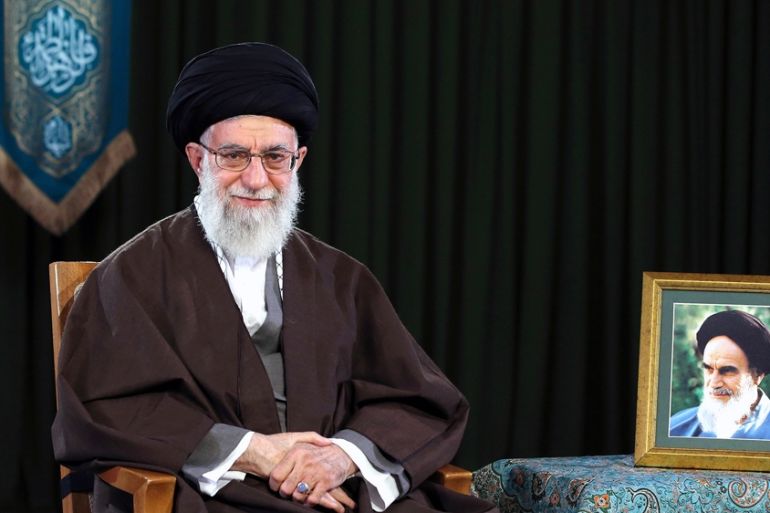Ayatollah Khamenei chides government’s economic record
Supreme leader says economy has stumbled, but President Hassan Rouhani touts ‘unprecedented’ economic growth.

Iran’s Supreme Leader says the government’s economic policies have fallen short and called for a new “resistance economy” to create jobs, piling pressure on President Hassan Rouhani before the presidential election in May.
“I feel the pain of the poor and lower class people with my soul, especially because of high prices, unemployment and inequalities,” Ayatollah Ali Khamenei said in his New Year’s message on Monday.
Keep reading
list of 4 itemsWho will be Iran’s next president? | Start Here
Oil slumps two percent on possible return of Iranian supply
Border security a common concern for Pakistan and Iran: Rouhani
“The government has taken positive steps, but they do not meet people’s expectations and mine,” he added, setting out a clear battle line before the presidential vote.
READ MORE: Iran after Khamenei
The New Year, or Nowruz, is the country’s most important national event.
Hardliners led by Khamenei have repeatedly criticised Rouhani, particularly for the terms of a nuclear deal he reached with world powers, which lifted economic sanctions and was supposed to boost the economy.
Unemployment stood at 12.4 percent in this fiscal year, according to the Statistical Centre of Iran, up 1.4 percent from the previous year. About 3.2 million Iranians are jobless, out of a total population of 80 million.
“I call the new year a year of resistance economy, production and employment,” Khamenei said in the pre-recorded video broadcast on state television.
Khamenei coined the term “resistance economy” to describe measures to make Iran’s economy more self-sufficient, in contrast to Rouhani’s policy of seeking to open Iran to more international trade and investment.
![In his own New Year address, Rouhani said he had curbed inflation and boosted the economy and employment [AP]](/wp-content/uploads/2017/03/38413b9f2525405587e9df13936b2063_18.jpeg)
‘Unprecedented’ growth
In his New Year’s message, Rouhani touted the economic achievements of his government and called for citizens’ rights to be respected, points likely to resonate with his supporters in the approaching election.
“What we achieved in curbing inflation [and boosting] economic growth and jobs in the past year was unprecedented in the past 25 years,” Rouhani said in a video message aired on state TV.
Khamenei’s latest criticism came as a number of prominent political figures, including Ayatollah Ahmad Jannati, the head of a body that selects Iran’s supreme leader, also criticised Rouhani for his economic policies.
|
|
But conservatives, who hope to stop Rouhani winning a second four-year term, have yet to identify their presidential candidate.
“Mr Rouhani can’t expect the Supreme Leader to take his side in the elections. The past has shown that the position of the Supreme Leader is more independent,” said Saeed Leylaz, a Tehran-based political analyst who worked as an adviser to former president Mohammad Khatami.
“After this new year period, Mr Rouhani can expect to face a lot of pressure and criticism.”
Despite the lifting of international sanctions, the world’s top banks have refrained from doing business with Iran over fears of being penalised by US sanctions that have remained in place despite the nuclear deal.
This has slowed Iran’s efforts to rebuild its foreign trade and lure investment.
Although inflation dropped to single digits and real GDP grew by as much as 7.4 percent, the IMF reported in February that “growth in [Iran’s] non-oil sector averaged 0.9 percent … reflecting continued difficulties in access to finance”.
“Aware of people’s economic woes, Ayatollah Khamenei is trying to distance himself from [Rouhani’s] government and move to the people’s side, minimising responsibility,” said Hossein Rassam, former Iran adviser to Britain’s Foreign Office.